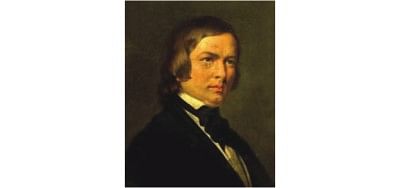Film on Robert Schumann’s compositions

A film on Robert Schumann's unforgettable music was screened recently to coincide with the bicentenary birth anniversary of the famous German composer (June 8, 1810- July 29, 1857). The event was organised by Dr. R.P. Jain, retired academic and music connoisseur.
Before the film began, Jain gave a brief rundown on Schumann. As he asserted, Schumann began to compose before the age of seven. However, his boyhood was devoted to literature as well as music, influenced in all likelihood by his father August Schumann, a bookseller, publisher and novelist.
When he was older he fell deeply in love with pianist Clara Wieck, who also composed music and had a remarkable concert career. Schumann had been attracted to Clara since she was 15. By the time she was 17, Schumann was in love with her. The next year (1837), Schumann asked her father for Clara's hand in marriage, but he refused. Finally after a protracted and bitter legal battle with Weick, the composer married Clara in 1840. Clara's works have recently gained appreciation by audiences the world over.
Unfortunately Schumanns' last days were greatly troubled. For the last two years of his life, after an attempted suicide, he was confined to a mental institution at his own request.
Two of Schumann 's compositions featured in the film screened in Delhi.
The first was Symphony No 1 in B flat major, Op 38 (“Spring”) The title of “Spring Symphony”, says Clara's diary, was given because of the Spring poems of Adolph Boettger. However, according to Schumann, he was inspired by the “Spring of Love.” The piece was rendered by the Vienna Philarmonic Orchestra, superbly conducted by the world acclaimed Leonard Bernstein, known for writing music for Broadway hits such as “West Side Story” and “Candide”.
The second piece was Piano Concerto in A minor, Op. 54. This is a famous Romantic concerto by Schumann, which was completed in 1845. On the piano was the low profile Argentinian Martha Argerich, recognised as one of the greatest modern day pianists. She was accompanied by the Gewandhaus Orchestra, Leipzig, under the baton of Riccardo Chailly.
All in all, Schumann' s magic melodies lingered on long after the film was over.

 For all latest news, follow The Daily Star's Google News channel.
For all latest news, follow The Daily Star's Google News channel. 



Comments